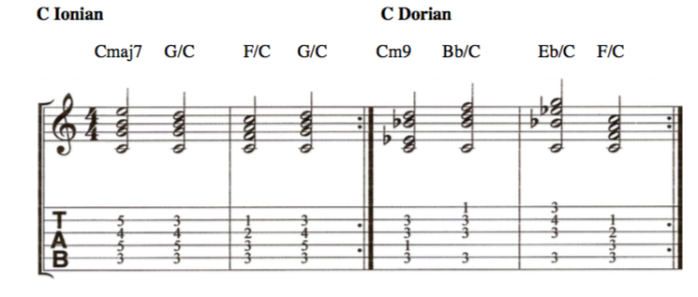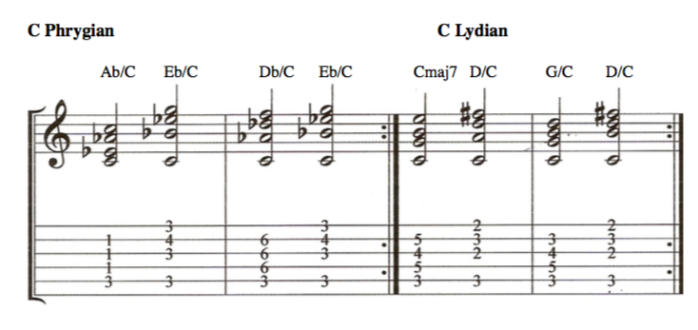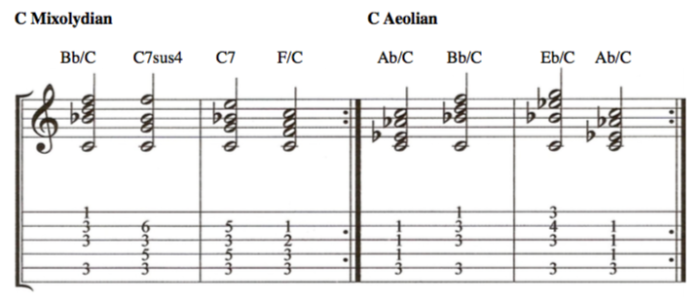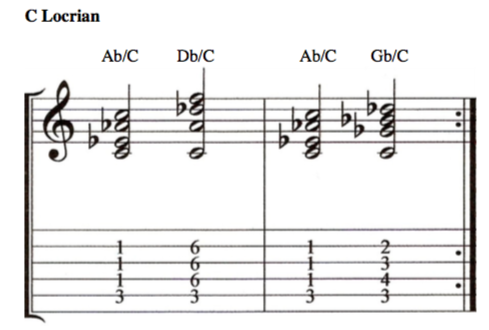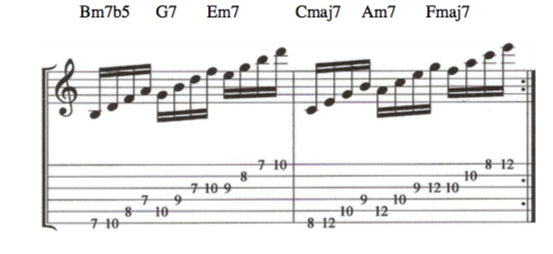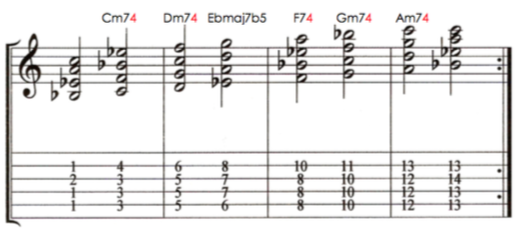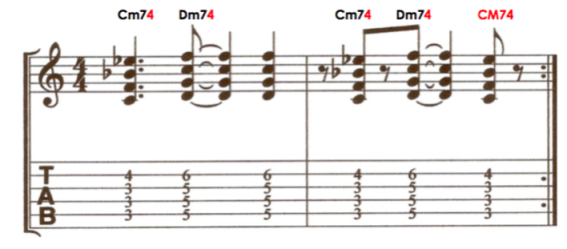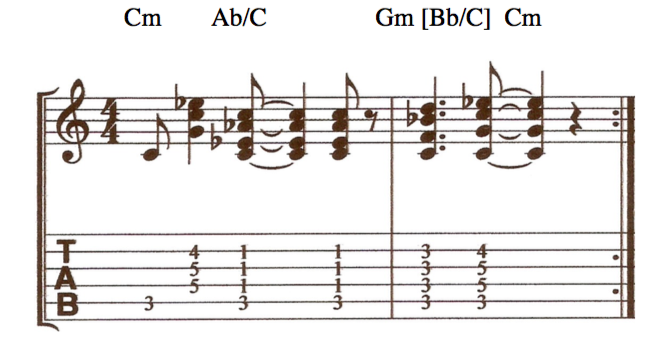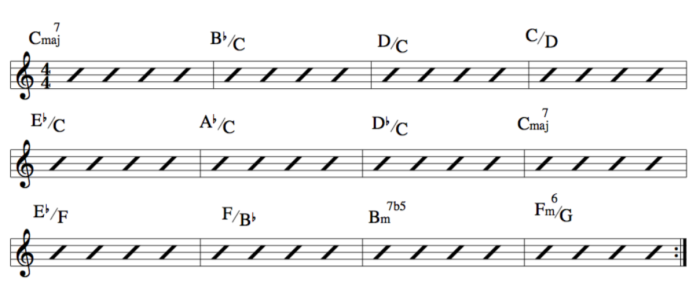 CLICK SUBSCRIBE!
CLICK SUBSCRIBE!
A mode of a major scale is just basically an INVERSION of that scale. This means that it is the same scale starting on a different note. What would be the point of this you may ask? Well each mode has its own unique flavour and corresponding harmony.
Many Guitarists/Musicians look at the Modes through the key of C major. This tends to leave them very “Confused” when for example someone says play C Locrian. Here many musicians will just play a scale of C major starting on a note of B natural when in fact they should be playing the D flat major scale starting on the note of C natural. Why is this?
First lets have a look at the Modes in C major, C major [or C Ionian]
C Ionian [Major 1st degree of scale]
D Dorian starts on 2nd degree of the C major Scale
E Phrygian starts on the 3rd degree of the C Major scale
F Lydian starts on the 4th degree of the C Major scale
G Mixolydian starts on the 5th degree of the C Major scale
A Aeolian starts on the 6th degree of the C Major scale
B Locrian starts on the 7th degree of the C Major scale
SIDE NOTE: PENTATONIC SCALES WITHIN THE C MAJOR SCALE
Also within the most used scale in western music is the most used scale in Pop and Rock. The minor and major pentatonic. [Again, you could start the pentatonic scale on any other degree of the major scale].
Guitar Cliches


Intervallic Relationships
C to D=1 tone
C to E=Major third
C to F=Perfect fourth
C to G=Perfect fifth
C to A=Major sixth
C to B=Major seventh
HOW TO REMEMBER THEIR NAMES IN ORDER
Ionian Dorian Phrygian Lydian Mixolydian Aeolian Locrian “If Dora Plays Like Me Al Listens"
TRANSPOSING THE MODES OF THE MAJOR SCALE
If we count up one whole tone [2 half steps] from C then we have the note of D the 2nd degree of the C major scale. From this D note we begin the D dorian mode.

So if the note D is the second note of the C major scale then what is C the second note of? Answer = B flat. You can either count down two half steps from C or up two half steps from B flat. So C dorian will have the same notes as B flat major and starting on its 2nd degree note of C [see ex.1]
EX.1 C Dorian
C Dorian 2 octaves
If E Phrygian is the 3rd degree [or the Major 3rd up from C] then what is C the 3rd degree of [or the Major 3rd up from]. Answer A flat. You can either count down five half steps from C or up five half steps from A flat.
EX.2 C Phrygian

C PHRYGIAN 2 OCTAVES
If F Lydian is the Fourth degree of C [or the perfect fourth up from C] then what is C the fourth degree of [or the perfect fourth up from]. Answer is G.
EX.3 C Lydian
C LYDIAN 2 OCTAVES
If G Mixolydian is the fifth of C [or the perfect fifth up from C] then what is C the fifth of [or the perfect 5th up from]. Answer is F.
EX.4 C Mixolydian
C MIXOLYDIAN 2 OCTAVES
If A Aeolian is the sixth of C[or the major 6th up from C] then what is C the sixth of [or the major 6th up from] Answer is E flat.
EX.5 C Aeolian

C Aeolian 2 octaves
If B Locrian is the seventh of C [or the major seventh up from] then what is C the seventh of [or the major seventh up from]. Answer D flat.
C LOCRIAN

C locrian 2 octaves
LOOKING AT HARMONY FOR TRANSPOSED MODES OF THE MAJOR SCALE
These next examples are played over a C Pedal Note in the bass to establish the Harmony and flavour of each mode. This is also useful for putting together little Vamps for practicing the Modes.
BEING CREATIVE WITH THE MODES
Back to Basics: To explore the “Harmony” of the modes we need to look at the arpeggios/ chords contained within them. We will look at the C major [Ionian] for simplicity’s sake.
Arpeggios contained within the C Ionian Mode [or C Major]

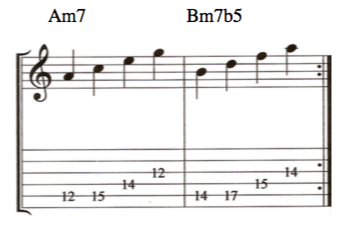
EXTENDING THE CHORDAL ARPEGGIOS: C IONIAN
With this in mind we can now extend the C Major [Ionian] arpeggios contained in the harmony. [Starting on the 4th degree F as it opens out the whole fingerboard for us.
MODES AS QUARTAL HARMONY:
It is quite common to employ Quartal Harmony. This harmony in 4ths gives a very intense jazzy sound as used by John Coltrane and Mcoy Tyner. [This is only one way of harmonising this, but it is quite common amongst jazz musicians].
CONSTRUCTING SIMPLE REPETITIVE VAMPS FOR PRACTICE: From the chords of the harmony above here is a simple “‘Dorian Mode” vamp.
DORIAN MODE IMPROVISATION
Below are a couple of pentatonic ideas to get you started. If we look at these elementary examples we can already see that within this modal scale there is much creative room for pentatonic and motific development.
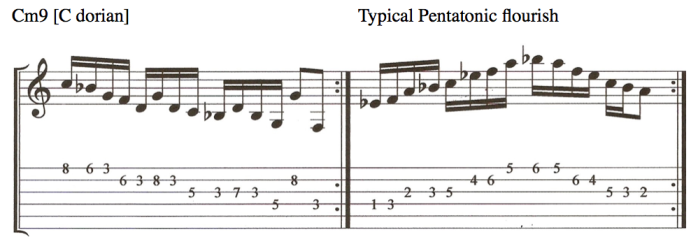
SUPERIMPOSITION
In this final Example [Using C dorian again] we can Exploit the Mode by Superimposing and flowing through its triads. [Starting on B flat to open up the Full finger board for us].
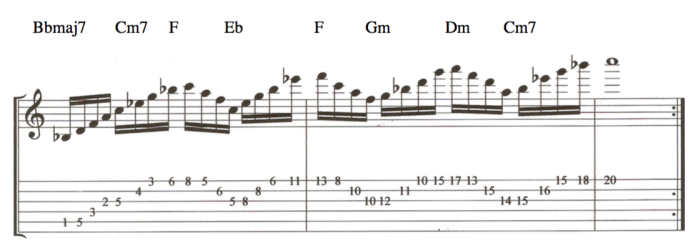
Note: *You can also make “Triad Pairs” From the above exercise*
C PHRYGIAN MODE
The Phrygian Mode has a “Spanish” Flavour to it. Play through the little example below and hear the semitone from the tonic to the supertonic that creates this distinctive Spanish sound.
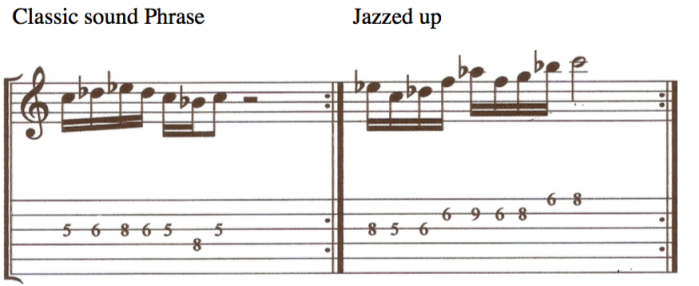
Longer Phrygian Mode Line
C LYDIAN MODE
Here we will look at the Lydian mode of C. Below this is a Variation of the same exercise but in plain C major [C Ionian]. Notice the difference that the F# adds to the flavour and harmonic content of C Lydian as opposed to the F Natural of C Ionian [C major].

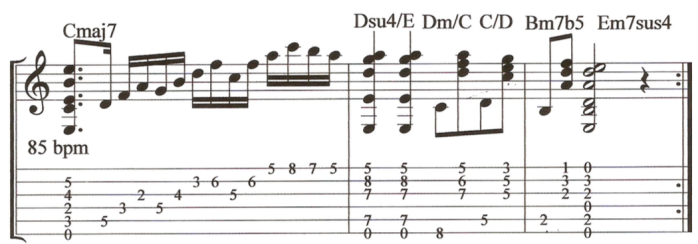
MIXOLYDIAN FOR DOMINANT 7THS
This scale can be used like a modulating scale. This is the Mixolydian. This is because whenever you have a Dominant 7th chord you will need to change the scale. E,g From C major C D E F G A B – to C7 you would need the B flat [flat7 to resolve to the major 3rd of the new chord/harmony] so you would have – C D E F G A B flat or C Mixolydian. Below we can see this scalic approach in action.
C MIXOLYDIAN F MIXOLYDIAN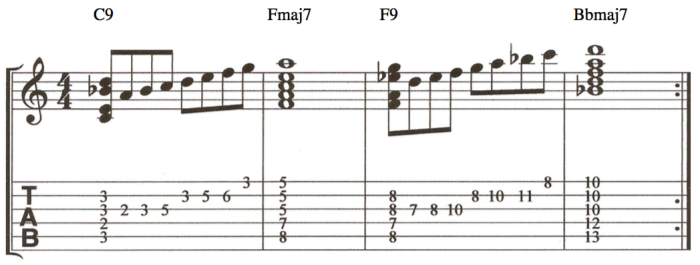
C AEOLEAN MODE
In this example Listen to the sound of the Harmony as you play through this simple Vamp. You will hear that the “Dominant” Chord is Minor and Not Major. I have left out the G note to create a C chord riff as you would hear in much AOR Rock/Pop Music.
This last Aeolean example is a modern fusion-esque approach
C LOCRIAN MODE
The next example is an angular phrase as used by guitarists like Robert Fripp.
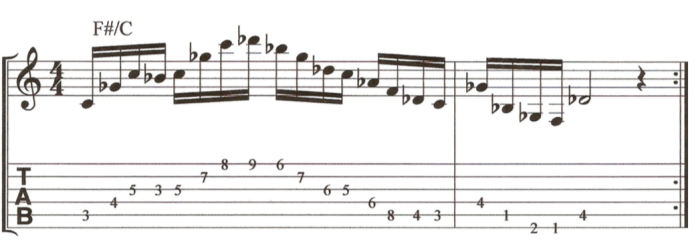
LASTLY,
Blues through the modes of C major for improvisation practice
















